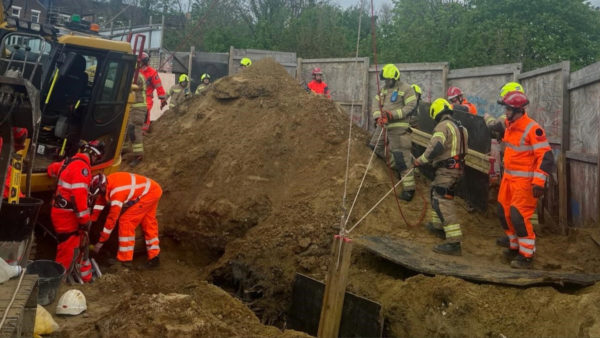
Clients are beginning to realise that technological innovation in construction needs to be accompanied by an experienced human presence on site to achieve the best results, says Chris Fadoju, a partner at Pellings.

Chris Fadoju
If you think the clerk of works role is an anachronism, a thing of the past, think again. At Pellings in the last three years we have doubled the number of clerks we employ, for one simple reason: the clients want them. So, raise a glass to the clerk of works.
In a post-Grenfell world, as we forensically examine what went wrong to cause this tragedy, there is a duty on all clients to ensure that site works are properly and safely undertaken.But, at the same time, the industry is being lambasted for its inefficiencies, for living in the dark ages, for being incredibly adversarial and not embracing modern technology.
Mark Farmer implores us to “modernise or die” – yet if we modernise at the expense of safety and a job properly done we will have achieved nothing.
It is the clerk of works, a role of many centuries’ standing, who provides the client with the most likely chance that this will be done. Why? Because he or she is a human being, not a robot – the “eyes and ears” of the site.
The clerk is not a mediator, arbitrator or an adjudicator, but the person who gets to know the bricklayers, the plumbers, the electricians, roofers and carpenters – the person who ensures that the job gets done and is done properly.
The clerk has a rapport with these guys because, more often than not, they have come from one of these trades. The role seldom has any contractual powers, yet in some respects the clerk of works is the most powerful person on the job.
Regular presence on site
Pellings is able to offer this service to clients at not a huge cost but in the knowledge that clerks offer huge value with their commonsense understanding of construction, the respect in which they are held by the workforce and their regular presence on site.
After all, if the client or its representative only visits the site once a week, how can they examine plumbing, soldering and electrical connections before they are sealed up by the contractor? And, when the contractor claims delays because of poor weather, there is one person who knows the veracity of that.
“No artificial intelligence, no robot, no collaborative relationship between client, architect, contractor, whoever, will replace that friendly tap on the shoulder.”
Until the 1980s, the role on public sector projects would invariably have been in-house, but when Margaret Thatcher brought in her highly controversial Right to Buy policy, local authority housing departments were effectively consigned to the scrap heap. Now public-sector clerks are almost non-existent.
Moreover, until recently, the trend towards partnering contracts, such as the PPC2000 or NEC contracts, seemed to preclude the need for a clerk. With the client, architect and contractor working together to agree the specification and build cost in tandem, there was a feeling of why the need for a “checker to check the checker”?
However, the industry has struggled over the years to totally buy into the ethos of Egan and Latham and has found in some circumstances that collaborative working relationships are too convoluted and laborious.
There has been something of a return to the JCT fixed-price model where the clerk of works role comes into its own. A similar argument applies with design and build contracts. For example, there is the need more than ever to check whether the contractor is putting in a damp-proof membrane correctly or is storing timber doors and frames in the site compound properly.
Different types of construction
In my view the role of the clerk of works in the employ of a consultant brings another very positive dimension, because he or she will be working on several projects at a time – with a good oversight of the pros and cons of various types of construction.
For instance, at Pellings we have monitored several Modern Methods of Construction (MMC) projects. Because everyone thinks it is the universal panacea for the failings of the industry, we have been brought in too late to prevent some issues such as defective installation of roofing membranes or inadequate ventilation to floor voids.
These result from a lack of co-ordination between the module suppliers and the main contractor – something a good clerk of works will pick up.
In my opinion no artificial intelligence, no robot, no collaborative relationship between client, architect, contractor, whoever, will ever replace that friendly tap on the shoulder suggesting the plumber redo a solder that has been improperly applied.
By all means use every technological trick in the book to make construction more efficient, but all onsite problems happen because of human error somewhere along the line – and it is only human input that can ensure it doesn’t happen.
Chris Fadoju is a partner at Pellings
Image: Abc4foto | Dreamstime
Comments
Comments are closed.









This is music to my ears. I think this article highlights exactly what troubles projects from the client’s perspective and is certainly an issue for me. Projects handed over with deep rooted problems, that if a Clerk of Works had been employed, could’ve been rectified for minimal cost and disruption. When they manifest themselves after handover, the cost, disruption and damage to reputation of the whole project team is huge.
At last someone else is talking sense, thank-you Chris. We have all suffered the client who’s eyes glaze over at insistence on quality and correction with consequences to programme. The client who penny pinches at every opportunity and then twists the specification when he sees the poor outcome. At site level I have always found fellow contractors and building personnel to eventually accept that getting the job accurate and right on quality pays dividends in the end. A shoddy job receives and rightly deserves contempt from us all. RBS
I am a building control officer and many clients naively feel that we are Clerk of Works and there to make sure that every element of the construction phase is correctly installed. This misconception of our role is confusing the clients as they do not understand what our role is and that we are not on the project full time to oversee every installation or detail as a Clerk of Works would be able to undertake .
If Clerk of Works were on every job the build quality would be raised exponentially and more mistakes and errors would be spotted before works are covered up negating long lasting deleterious effects and costly retrospective opening up works to rectify these errors.Architects and Project Designers / Planners should be encouraged to recommend to clients the necessity for COW’s on their projects as a safeguarding principle , not just relying on building control inspections which cover the statutory bare minimum and are different in nature in any case.Surely it is counter-intuitive for clients not to want to include this service when one considers the massive investment they are making in the project in comparison to the negligible costs of engaging an Independent arbiter who can be there on site for the minutea of site installations and operations.
The “Clerk of Works” role sound very much similar to the United States Construction Quality Control Manager’s role, serves as an independent third-party who is responsible for monitoring project performance and client satisfaction as they relate to the prime contractor’s construction policies and best practices. He or she must be a full-time employee of the prime contractor with a bachelors degree in construction or engineering with at least 5years experience in the trades including a current United States Army Corps of Engineers Construction Quality Control Management for Contractor certification and must be able to identify and prevent potential errors and mistakes and reducing rework by inspecting Trade Contractors work at the earliest possible opportunity. At the completion of the project, provide the owner with a facility that meets or exceed their requirements.
Well !! finally the pigeons have come home to roost Chris and Pellings have seen the light and are doing and saying what should have been the norm since the eighties when design,construct and supervise under the main contractors roof became the norm, with the subsequent failures in quality control due in the main to unqualified people being employed and the main impetus being directed to increase profit with the lack of any quality control. The sooner the industry reverts to the Client, Architect and or Engineer, Clerk of Works system, will only be the better for all concerned.
Never forget those two basic precepts of any business: Morality and Competence.
Sadly there are still many out there who find those two concepts difficult to grasp.
If a Client wants to employ/retain a professional team (including a Clerk Of Work/Inspector), they have that option under any contractual arrangement, traditional or Design & Build.
Unfortunately, most Clients just want to take the cheapest route and therefore don’t employ such a team as it would be at their cost. They expect to pay less but still get the same finished product.
The underlying issue (in my opinion) is lack of experience of those ‘inspecting’ work, whether working for the Client team or for a D&B contractor. Bottom line, you get what you pay for and need to pay for in-built quality.
Sadly the CoW has a passing mention in the JCT contract to that of adviser to the Employers Agent or Architect. However, if either of them fail to heed the COW observations then on their own head be it. And the NEC has no CoW in it at all, recycled as a Project Supervisor. I have undertaken the CoW role on D&B new build and my premis when I started out with the site manager was that we are a team both looking out for each other with the same goal to deliver perfection (well you have to aim high). Trouble is these days the culture of builders has changed, some are still highly rated and respectful but there is still an element of workers who don’t like to be given direction and the clerk can change that for the better. A good CoW would probably pay for himself in terms of quality, time and cost on the job. It was stand by your beds time when the clerk arrived. A good clerk will get to know everyone by name and emanate trust.
Chris, a very good piece which runs nicely with one posted on behalf of The Institute of Clerks of Works and Construction Inspectorate (ICWCI) just a few days ago – see http://bit.ly/2x50f2V. If the ICWCI can assist Pellings in any way, please do not hesitate to make contact.
Having worked in every aspect of the construction/civils/maintenance industries all my life.15 years ago I spent 4 years doing a Bsc (hons) in Construction Project Management. Recently I decided to change from being a freelance site/project manager and move into freelance inspector/CoW roles.
One of the main reasons I made this move being that I noticed senior management informing clients that site teams were to blame when HSEQ went wrong when in fact it’s because senior management had been pushing too hard to save money often thinking that the quality would sort it’s self out at the end of the project, which it doesn’t.
It’s good to see that COW’s are now raising written observations and trackers on quality, environment, health and safety as appose to verbal advice which a lot of the time gets ignored.
A lot of the so called construction professionals keep banging on about not have a blame culture, these are normally the ones who also bury their heads in the sand when it comes to taking responsibility and making a decision.
Good written CoW observations bring everything out into the open and force people to make decisions, this will reflect on who is/isn’t doing their job properly, whether it be designers, estimators/QS’s, construction/contract managers, clients/developers,subcontractors/tradespeople etc. no one can hide from a good written observation which normally has a good written description and photo of the offending blunder, that’s the way it should be.
It also gets rid of a lot of the office politics too, which we all can do without. If the office politicians spent more time focusing on drawings and specifications as appose to bitching and backstabbing, the construction industry would be a far better place for us all to work in.
However, the CoW role possibly needs to evolve more, I disagree with the stereotypical CoW’s being mainly retired tradespeople often with limited IT skills and who are often too focused on their own trade. Construction Management graduates and experienced/seasoned construction managers could be the way forward for the CoW role, but to attract this caliber of people, clients need to be prepared to pay more for CoW’s, we are after all managing the management.
Housing New Zealand currently operate a team of New Build Quality Assessors whose function is that of a Clerks of Works. I identified the need two years ago while design manager on a delivery programme and with previous experience in the British Royal Engineers (Army) it was an obvious solution.
Excellent article Chris, and some brilliant comments regard the CoW’s position, I certainly remember the CoW’s position from a number of public works contracts I worked on in the past, and know how important they were.
I’m currently doing research into this for my dissertation for my degree in construction management, also looking to develop a more robust onsite compliance process, that would be ideally overseen by the CoW’s,
The process would run on the same principle as the CSCS card system but have a more quality focused agenda regarding those who work on construction projects, so if anyone would be willing to help please contact me via my LinkedIn page, as your views and opinions would be greatly appreciated, and will certainly help me towards developing a system that can work better on site
For the past few years all I’ve been told is the solution to defects and quality is to use a tablet with either Priority 1 or SnagR. These don’t solve defects or improve quality they just record these items. You need people who understand how to build and know how to talk with the people putting the building together. So to hear someone else say “people build buildings, not robots or computers” is refreshing. We need competent and well rewarded operatives to build correctly, not people with great IT skills but don’t know how to build properly.
If you ask most Construction/Project/Site Managers how they ‘manage quality’, the usual response will be to describe an ‘inspection process’. They just don’t get it that an ‘inspection process’ is not ‘managing quality’, it is simply what is says, ‘inspection’. Managing quality is about putting measures in place ‘before’ the event, i.e. measures to reduce the risk of getting it wrong in the first place. Good quality management will reduce the need for inspection and reduce snagging.
So all you guys out there in charge of construction projects please understand or learn the concept of ‘managing quality’ and don’t just depend on ‘inspections’. One can only inspect when the work is done, often too late.
An excellent article and some good constructive comments. I have been a member of the ICWCI for 30yrs and a Fellow. I have seen a lot of changes in this time and as usual things go in cycle. I have come to the conclusion that the only way to improve quality standards in the industry is for the Government to make it a requirement for the role of a qualified COW or similar person to be a contractual condition in all construction related contracts, like clause 12 in the old JCT 80. This will put the onus on all clients public/private to allow the cost of ensuring quality and good workmanship is delivered.
Mark Farmer implores us to “modernise or die”
The use of smart helmets / smart glasses that can capture every action of every worker do on site, then sent to a central control hub for observation, or have the recording recalled at any time to hold any liable parties accountable will have a positively dramatic effect on the quality on works as per drawings etc. I do not dispute the advantages to the project as a whole by having a good CoW but good project managers will make sure the work gets done properly and good CoW add the personal touch that technology can back up. Progress is a partnership.